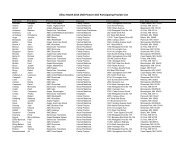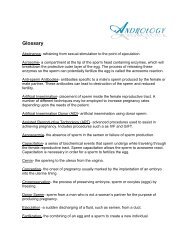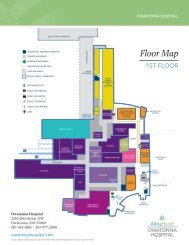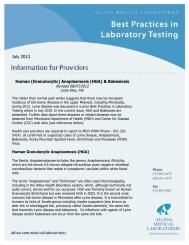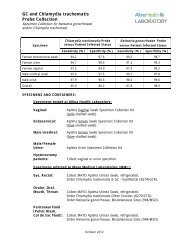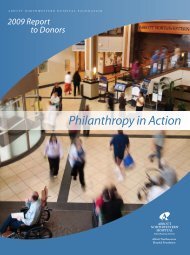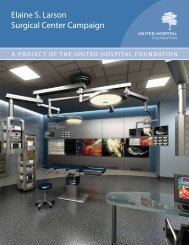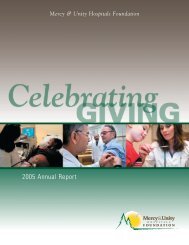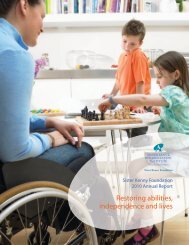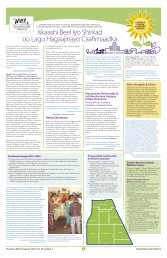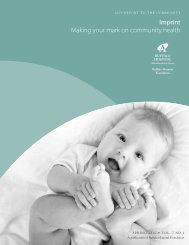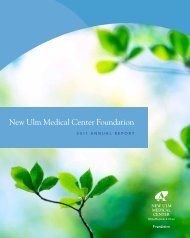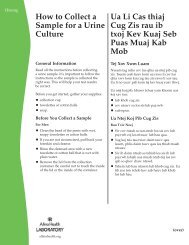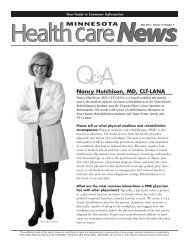Winter 2013 - Allina Health
Winter 2013 - Allina Health
Winter 2013 - Allina Health
Create successful ePaper yourself
Turn your PDF publications into a flip-book with our unique Google optimized e-Paper software.
winter <strong>2013</strong><br />
issue 006<br />
Refresh and<br />
renew this<br />
winter<br />
02<br />
Heart disease<br />
prevention focuses on<br />
the whole person<br />
04<br />
St. Paul neighbors<br />
discover yoga<br />
14<br />
Well-child resources<br />
for parents<br />
15<br />
Move your health<br />
forward in <strong>2013</strong><br />
allinahealth.org
community good to know health<br />
Prevention: It’s powerful medicine<br />
MAP³ clinic ‘focused on me as a whole person’<br />
Lori Anderson-Tepley knows from<br />
experience that it’s better to prevent<br />
health problems than to deal with<br />
them later. Anderson-Tepley, 56, has<br />
type 1 diabetes and other health<br />
problems that stem from it.<br />
She sought out a new clinic that<br />
focuses on prevention, especially heart<br />
disease and stroke. The clinic, My<br />
Assessment and Personal Prevention<br />
Program (MAP³), is part of United<br />
Heart & Vascular Clinic (UHVC) at<br />
United Hospital in St. Paul.<br />
Participants get a complete picture<br />
of their health by meeting with a<br />
preventive cardiologist, nutritionist<br />
and exercise physiologist. Then they<br />
choose specific steps to improve their<br />
health.<br />
“The whole emphasis was how to<br />
improve what I’m doing,” said<br />
Anderson-Tepley, who’s from St. Louis<br />
Park. “When you can do something<br />
before a problem happens, that’s<br />
powerful. The clinic gave me some<br />
new tools to work with.” She was so<br />
impressed that she referred her<br />
husband, who had an appointment<br />
several months ago.<br />
Her first appointment was with<br />
Courtney Baechler, MD, MS, a<br />
specialist in preventive cardiology and<br />
the MAP³ clinic medical director at<br />
UHVC. Baechler also serves as vice<br />
president of the Penny George<br />
Institute for <strong>Health</strong> and Healing, part<br />
of <strong>Allina</strong> <strong>Health</strong>.<br />
Lori Anderson-Tepley gained insights into her health at a new prevention<br />
clinic offered by United Heart & Vascular Clinic.<br />
They discussed the complexities of<br />
Anderson-Tepley’s health, focusing on<br />
her child-onset diabetes and related<br />
problems. Diabetes often leads to<br />
heart disease, so Anderson-Tepley<br />
and her family doctor watch her<br />
cholesterol closely. Her doctor<br />
suggested she start a statin medicine<br />
to reduce her cholesterol.<br />
Anderson-Tepley asked for<br />
Baechler’s advice, so they discussed<br />
several options to lower her cholesterol,<br />
including a nutritional supplement.<br />
“I’m hoping that with the right diet and<br />
exercise, I can avoid medication,”<br />
Anderson-Tepley said. For now, they’re<br />
watching her cholesterol levels.<br />
Baechler also recommended that<br />
Anderson-Tepley have a heart scan,<br />
which showed her there was no<br />
cholesterol buildup in the coronary<br />
arteries.<br />
2 | HEALTHY COMMUNITIES
“The whole emphasis was<br />
how to improve what I’m<br />
doing,” said Anderson-<br />
Tepley, who’s from St. Louis<br />
Park. “When you can do<br />
something before a problem<br />
happens, that’s powerful.”<br />
Nutritionist<br />
Maureen Doran<br />
suggested ways to<br />
modify food groups<br />
in her diet because<br />
a medically<br />
restricted diet<br />
prevents her from<br />
eating fresh fruits<br />
and vegetables.<br />
Courtney Baechler,<br />
MD, MS<br />
Anderson-Tepley said she learned<br />
some new foods that fit well in her<br />
diet, such as nut butters for protein<br />
and a main dish of mashed potatoes<br />
and squash.<br />
With exercise physiologist Kim<br />
Seibert, Anderson-Tepley discussed<br />
walking as her main form of exercise.<br />
Seibert urged her to walk more when<br />
she could and add regular exercises<br />
for strength and flexibility. Anderson-<br />
Tepley uses a MAP³ online resource<br />
to do the exercises at home.<br />
She appreciates that the clinic<br />
“focused on me as a whole person.<br />
That’s critical to me. I need to own<br />
this and follow through. I also felt<br />
very safe, because they covered every<br />
aspect of my health risks. When I left<br />
the clinic, I felt that I could make<br />
some changes and feel better overall.”<br />
Your medical condition + diet + exercise =<br />
Complete picture of your health<br />
For a holistic look at your health, it makes sense to consider diet and<br />
exercise along with your medical condition.<br />
That’s the idea behind a new prevention clinic, My Assessment and<br />
Personal Prevention Program (MAP³). In a series of appointments<br />
totaling two and a half hours, you’ll look closely at your health and<br />
learn how to improve it.<br />
The appointments include:<br />
• 40 minutes with a preventive cardiologist — Courtney Baechler, MD,<br />
MS; Nazifa Sajady, MD; or Elizabeth Tuohy, MD. The cardiologist<br />
will assess your risk factors, including family history of heart disease,<br />
medical history, lifestyle and health behaviors. Lab tests and a<br />
cardiovascular physical are included.<br />
• 60 minutes with a nutritionist, emphasizing how to eat to feel well.<br />
• 30 minutes with an exercise physiologist, reviewing your activity<br />
level and how to maximize it. (There is no exercise test.)<br />
At the next appointment, you’ll meet with a nurse practitioner<br />
to review the experts’ assessment and clinical data. Based on this<br />
information, you’ll choose several specific ways to improve. If any<br />
medical problems are found, referrals will be provided. The clinic<br />
offers ways to keep your progress on track, including an online<br />
program, exercise coaching and additional nutrition counseling.<br />
“Many people want a deeper understanding of their health — about<br />
how the choices they make affect their health risks,” said Courtney<br />
Baechler, MD, MS, MAP³ clinic medical director at United Heart &<br />
Vascular Clinic (UHVC). The clinic focuses on preventing heart disease<br />
and stroke, two main causes of serious illness and death. Baechler<br />
noted that one-third of MAP³ patients discover a problem they didn’t<br />
know they had.<br />
Check with your health insurance company for details on coverage<br />
for the MAP³ clinic.<br />
Call for an appointment<br />
To make an appointment at the MAP³ clinic, call UHVC at<br />
651-292-0007. Visit unitedhospital.com for more information.<br />
allinahealth.org | 3
community health<br />
St. Paul neighbors<br />
discover yoga<br />
Hannah Hendrickson guides her<br />
mother Mary, center, and Justine<br />
Nelson in their yoga poses.<br />
Through a grant from <strong>Allina</strong> <strong>Health</strong>, people<br />
in Mary Hendrickson’s St. Paul<br />
neighborhood discovered yoga.<br />
Last summer, Hendrickson received a<br />
grant from the <strong>Allina</strong> <strong>Health</strong> program<br />
called Neighborhood <strong>Health</strong> Connection.<br />
Grants funded a wide range of health<br />
improvement projects, from community<br />
gardens to a walking club with a scavenger<br />
hunt, said Heather Peterson, director of<br />
Community Engagement for the <strong>Allina</strong><br />
<strong>Health</strong> east metro region. “It’s amazing<br />
what neighbors, working together, can<br />
achieve in enjoying better health,” she said.<br />
Hendrickson organized exercise<br />
activities last summer for women in her<br />
Midway neighborhood. One evening, a<br />
handful of women took a three-mile hike<br />
through the neighborhood. Another time, a<br />
small group biked for an hour. Each event<br />
drew neighbors who knew one another and<br />
some who didn’t. Everyone got to know<br />
each other better, Hendrickson said.<br />
The group’s favorite activity took place<br />
on a beautiful August evening in the<br />
neighborhood’s Newell Park. Six women<br />
learned yoga under a canopy of oak trees,<br />
ending with silent meditation.<br />
“It was so relaxing! Yoga is gentle and low<br />
impact, and it’s great for flexibility. Some of<br />
the women weren’t sure of the physical<br />
benefits. But when they felt their muscles<br />
the next day, they knew yoga was good for<br />
them,” Hendrickson recalled with a laugh.<br />
Hendrickson had a built-in connection<br />
to a yoga teacher — her daughter, Hannah.<br />
She recently finished her yoga certification<br />
and volunteered so she could get practice<br />
teaching.<br />
The neighborhood activities finished<br />
with a softball game and potluck picnic for<br />
families on Labor Day weekend. As<br />
Hendrickson talked with neighbors, they<br />
agreed that they wanted to continue with<br />
yoga.<br />
Starting in October, the group moved<br />
indoors to Hendrickson’s living room.<br />
Every other Monday evening, you’ll find<br />
Hannah leading them through a range<br />
of yoga poses.<br />
Visit neighborhoodhealthconnection.org for resources that can help you<br />
connect with your neighbors and improve your health.<br />
Yoga for the Deskbound<br />
Feeling tight, sluggish or wired at<br />
work? Try yoga.<br />
Practicing yoga can reduce stress,<br />
lower blood pressure and heart rate,<br />
and relax muscles. It can also boost<br />
mood and energy levels. Plus, it can<br />
relieve back pain and even help with<br />
carpal tunnel syndrome.<br />
Power Up—Start with Mountain<br />
Pose. Stand with your feet hip-width<br />
apart, equal weight on both feet.<br />
Draw in your abdomen, lift your<br />
chest, and keep your shoulders<br />
relaxed and down. Arms hang down<br />
at your sides. Relax your neck and<br />
feel as if your spine is being lengthened<br />
4 | HEALTHY COMMUNITIES<br />
each time you inhale. Take<br />
three deep breaths.<br />
Sit Tall—Stuck at your desk? Sit on the<br />
chair edge with feet on the floor about<br />
hip distance apart. Place palms on<br />
thighs and lengthen the spine as you<br />
inhale. Hold the pose for three breaths.<br />
Inhale and lift arms overhead. Take<br />
hold of the left wrist with your right<br />
hand and as you exhale, bend right.<br />
Stay for three breaths. Inhale back up,<br />
release arms and roll your shoulders.
community health<br />
Our commitment<br />
to building healthy<br />
communities<br />
<strong>Allina</strong> <strong>Health</strong> is committed to<br />
improving the health of the<br />
communities it serves not only by<br />
providing expert medical care when<br />
you’re sick, but also by helping you<br />
stay well. That’s why <strong>Allina</strong> <strong>Health</strong><br />
launched two new programs —<br />
Neighborhood <strong>Health</strong> Connection<br />
and School <strong>Health</strong> Connection<br />
— that reach residents of all ages.<br />
Neighborhood <strong>Health</strong><br />
Connection <br />
Research shows that social<br />
connections help make everyone<br />
healthier. So the Neighborhood <strong>Health</strong><br />
Connection program is designed to<br />
bring community members together<br />
to build connections and increase<br />
healthful activities, said Ruth Olkon,<br />
manager of community programs.<br />
“Our website has great information<br />
and ideas on how to start your own<br />
neighborhood groups and implement<br />
healthy activities using the online<br />
toolkit,” Olkon said.<br />
Here’s a look at some of the<br />
programs Neighborhood <strong>Health</strong><br />
Connection created this year:<br />
• Free health screenings: <strong>Allina</strong><br />
<strong>Health</strong> provided free health<br />
screenings to 37 neighborhoods.<br />
When people know their blood<br />
pressure, glucose levels and body<br />
mass index, they can take steps<br />
to improve them, Olkon said.<br />
• Pedometer Fitness Challenge:<br />
Community-based teams applied<br />
to receive free pedometers and<br />
access to online resources to track<br />
progress and increase their daily<br />
physical activity. The program<br />
reached more than 1,000 people.<br />
• Grant opportunities: The<br />
Neighborhood <strong>Health</strong> Connection<br />
offered an opportunity for neighbors<br />
and community organizations to<br />
apply for grants to support their own<br />
healthy programs, such as hosting a<br />
5K run/walk, building a community<br />
garden or creating a walking club.<br />
School <strong>Health</strong><br />
Connection <br />
To help kids set the foundation for<br />
lifelong health, the School <strong>Health</strong><br />
Connection program partners<br />
with 10 elementary schools. It<br />
consists of five components:<br />
• A $10,000 grant: The grant<br />
goes toward improving each<br />
school’s unique health needs.<br />
• Monthly consultation with a<br />
doctor from a nearby <strong>Allina</strong><br />
<strong>Health</strong> clinic or partner clinic:<br />
The doctor talks with the school’s<br />
staff members about issues they’re<br />
dealing with, such as preventing<br />
concussions or handling food<br />
allergies.<br />
• Training sessions for teachers and<br />
other staff members: “Throughout<br />
the school year, the schools choose<br />
topics most important to them,<br />
such as obesity or depression,”<br />
said Susan Nygaard, manager of<br />
community health improvement.<br />
• Online learning tools: Teachers<br />
can incorporate any of the 50<br />
different health lessons developed<br />
by <strong>Allina</strong> <strong>Health</strong>.<br />
• <strong>Health</strong> fairs: At the fair, staff<br />
members, students and their<br />
families can learn more about<br />
the School <strong>Health</strong> Connection<br />
program in a fun and interactive<br />
atmosphere.<br />
Get healthy! Learn how these programs<br />
can help improve the health of your community<br />
by visiting neighborhoodhealthconnection.org.<br />
allinahealth.org | 5
mom and baby<br />
Getting ready<br />
for baby?<br />
<strong>Allina</strong> <strong>Health</strong> provides<br />
care and comfort<br />
for moms-to-be<br />
<strong>Allina</strong> <strong>Health</strong> welcomes families to<br />
be part of the experience at its birth<br />
centers.<br />
what to expect<br />
Learn about every stage of<br />
pregnancy, from preconception<br />
care to feeding your newborn,<br />
by visiting allinahealth.org/<br />
pregnancy.<br />
Having a baby is an exciting time. But it<br />
can also come with some uncertainty.<br />
<strong>Allina</strong> <strong>Health</strong> understands the physical<br />
and emotional needs of new and<br />
expecting parents. From the time you<br />
begin planning a pregnancy to when<br />
you get settled back at home after the<br />
birth, <strong>Allina</strong> <strong>Health</strong> offers complete<br />
mother and baby services.<br />
“<strong>Allina</strong> <strong>Health</strong> delivers about<br />
14,000 babies among our 10 hospitals<br />
each year,” said Michael Slama, MD,<br />
obstetrician/gynecologist and<br />
physician leader for <strong>Allina</strong> <strong>Health</strong><br />
mother-baby services. “Regardless of<br />
where a woman delivers, she receives<br />
the same comprehensive care. We<br />
want to provide the right level of care<br />
for every pregnancy and birth — from<br />
the simple to the most complex.”<br />
Preparing for baby<br />
Women planning to have a baby<br />
can choose an obstetrician or family<br />
medicine doctor who delivers at an<br />
<strong>Allina</strong> <strong>Health</strong> hospital. Doctors work<br />
to help prepare each woman for a<br />
healthy pregnancy. For example, your<br />
doctor may suggest lifestyle changes<br />
that boost fertility and aid in easier<br />
childbirth. He or she can also prescribe<br />
prenatal vitamins or help decide the<br />
best time to stop birth control (see<br />
sidebar on Page 7 for more on<br />
preconception care).<br />
Comprehensive care<br />
<strong>Allina</strong> <strong>Health</strong> provides additional<br />
services to fit every need. For<br />
example, OB Homecare nurses visit<br />
expecting moms in their homes or<br />
workplaces to help with special<br />
medical needs. This may include<br />
giving IVs (intravenous route, which<br />
is the fastest way to deliver fluids<br />
throughout the body) to help hydrate<br />
women who are experiencing severe<br />
nausea and vomiting, or providing<br />
medicine to prevent preterm labor.<br />
In addition, home nursing visits are<br />
provided to these moms and their<br />
babies after hospital discharge to<br />
ensure everything is going well<br />
after they get home.<br />
6 | HEALTHY COMMUNITIES
community health<br />
“OB Homecare nurses are part of the<br />
<strong>Allina</strong> <strong>Health</strong> mother-baby care team,”<br />
said Nancy Reiners, RN, OB Homecare<br />
manager. “We don’t take the place of a<br />
clinic visit. Rather, we complement care<br />
by providing needed nursing services to<br />
patients in their homes.”<br />
Care for high-risk<br />
pregnancy<br />
Women who have a high-risk<br />
pregnancy, such as those pregnant<br />
with multiple babies, may be referred<br />
to a perinatologist — a doctor who<br />
cares for high-risk pregnancies.<br />
High-risk pregnancy care with<br />
<strong>Allina</strong> <strong>Health</strong> is provided though<br />
Minnesota Perinatal Physicians.<br />
These specialty doctors offer<br />
advanced diagnosis and testing for a<br />
wide range of medical issues. They<br />
provide comprehensive medical<br />
treatment and perform specialized<br />
procedures for mothers and babies.<br />
“We offer a complete resource<br />
for high-risk pregnancy needs,”<br />
said Michele Stout, manager of the<br />
perinatal clinics for <strong>Allina</strong> <strong>Health</strong>.<br />
Registered nurses at <strong>Allina</strong> <strong>Health</strong><br />
hospitals answer questions for families<br />
and help care for moms and babies.<br />
Through a partnership with Minnesota<br />
Perinatal Physicians, <strong>Allina</strong> <strong>Health</strong><br />
hospitals are fully equipped to handle<br />
multiple and high-risk pregnancies.<br />
“From diagnosis to treatment, we<br />
make sure each mother and baby<br />
gets the best care available.”<br />
A better birth<br />
experience<br />
The birth center in each <strong>Allina</strong> <strong>Health</strong><br />
hospital is focused on providing women<br />
with a calm, inviting place to have their<br />
babies. For example, the birth center at<br />
United Hospital offers free massages<br />
and an aromatherapy program.<br />
“We are so proud of our services<br />
for expecting moms,” said Kathy<br />
Schoenbeck, director of the United<br />
Hospital Birth Center. “Our goal is<br />
to make their birth experience as<br />
wonderful as possible.”<br />
Lactation consultants offer<br />
breastfeeding support to women<br />
in the hospital after discharge in<br />
the hospital-based clinics.<br />
“For many women, breastfeeding is<br />
the most challenging part of their role<br />
as new mothers,” said Cathy Skrypek,<br />
RN, lactation consultant for <strong>Allina</strong><br />
<strong>Health</strong>. “As lactation consultants, we<br />
strive to empower women and build<br />
their confidence in this new skill.”<br />
Getting<br />
off to the<br />
right start<br />
At <strong>Allina</strong> <strong>Health</strong>, we believe that<br />
a healthy pregnancy starts with<br />
a healthy mom. If you’re thinking<br />
about having a baby, it’s a<br />
good idea to visit your doctor<br />
for preconception planning.<br />
“Ideally, women should meet<br />
with their family medicine doctor<br />
or obstetrician/gynecologist<br />
about three to six months before<br />
trying to conceive,” said Michael<br />
Slama, MD, obstetrician/gynecologist<br />
and physician leader for<br />
<strong>Allina</strong> <strong>Health</strong> mother-baby<br />
services.<br />
Your doctor may also suggest<br />
ways to prepare for a healthy<br />
pregnancy, such as beginning an<br />
exercise routine, taking folic acid,<br />
eating nutritious foods, getting<br />
certain immunizations and<br />
quitting smoking.<br />
“Every pregnancy is unique,”<br />
Slama said. "We work with each<br />
woman to help her conceive<br />
and have the best pregnancy<br />
possible.”<br />
allinahealth.org | 7
mom and baby<br />
How much do<br />
you know about<br />
newborns?<br />
Because babies don’t enter the world with<br />
instruction manuals, testing your knowledge<br />
of newborns can help you prepare for a<br />
little one who’s on the way — or learn more<br />
about your new bundle of joy.<br />
1. What is the average birth weight<br />
for newborns?<br />
a about 15 pounds<br />
b about 4 pounds<br />
c between about 7 pounds and 8 pounds<br />
d between 9 pounds and 12 pounds<br />
2. How long should babies breastfeed?<br />
a until they’ve had enough<br />
b one hour<br />
c 30 minutes<br />
d five minutes<br />
3. What are some signs that a baby<br />
is getting enough milk?<br />
a gains a pound per week<br />
b regains birth weight in 10 to 14 days<br />
c has at least six wet and three soiled<br />
diapers a day<br />
d b and c<br />
4. How much do newborns sleep each<br />
day, on average?<br />
a at least 16 hours<br />
b between five and 10 hours<br />
c six hours<br />
d 11 hours<br />
Answers<br />
1.c — between about 7 and 8 pounds<br />
2. a — until they've had enough. About 15 to<br />
20 minutes on each breast may be enough.<br />
3. d — b and c<br />
4. a — at least 16 hours. The average<br />
newborn spends at least 16 hours a day<br />
sleeping, but there can be big differences<br />
from one newborn to the next.<br />
The Mother Baby Center:<br />
Due February <strong>2013</strong><br />
In February <strong>2013</strong>, Abbott<br />
Northwestern Hospital and<br />
Children’s Hospitals and Clinics<br />
of Minnesota will be opening<br />
The Mother Baby Center.<br />
“The ultimate goal of creating<br />
the center is to bring mothers and<br />
their babies closer together,” said<br />
Michelle Smith, RN, interim director<br />
of the Birth Center at Abbott<br />
Northwestern Hospital.<br />
Previously, parents whose<br />
newborns required the higher levels<br />
of care offered at Children’s had<br />
to travel through a long tunnel to<br />
visit their newborn. “Having the<br />
neonatal intensive care unit and<br />
special care nursery on the same<br />
floor where mothers give birth and<br />
stay gives parents easy access to<br />
their babies, and peace of mind<br />
knowing they’re nearby,” Smith<br />
said. The Mother Baby Center<br />
will continue to offer the whole<br />
spectrum of what a mother could<br />
want for her child’s birth. This<br />
includes everything from midwives,<br />
We’re<br />
EXPECTING<br />
The Mother Baby Center.<br />
Due February <strong>2013</strong>.<br />
Experts in the expecting<br />
and the unexpected.<br />
A great place to have<br />
a baby. A great place<br />
to be a baby.<br />
TheMotherBabyCenter.org<br />
The Mother Baby Center is located between<br />
Abbott Northwestern Hospital and Children's<br />
Hospitals and Clinics of Minnesota.<br />
water births, aromatherapy and<br />
healing touch to the most advanced<br />
medical interventions, Smith said.<br />
Some of The Mother Baby Center’s<br />
unique features include:<br />
• large private rooms<br />
• in-room labor tubs and water<br />
birth services<br />
• in-room sleep accommodations<br />
and family sleep rooms.<br />
Take a virtual tour!<br />
Tour The Mother Baby Center online<br />
by visiting themotherbabycenter.org.<br />
8 | HEALTHY COMMUNITIES
good to know<br />
Well-child visits:<br />
A great opportunity for parents<br />
Well-child visits help keep your child<br />
healthy. What happens at these<br />
appointments? Your child’s doctor may<br />
weigh, measure and check your child’s<br />
growth, sight, hearing and teeth. The<br />
doctor may also give your child shots<br />
to prevent disease and test your child<br />
for illnesses.<br />
“Well-child visits are an important<br />
tool that health care providers use to<br />
screen for medical and developmental<br />
issues, and to complete required<br />
immunizations,” said Diane Adamski,<br />
MD, chairwoman of the <strong>Allina</strong> <strong>Health</strong><br />
ambulatory pediatrics council.<br />
“In addition to the medical exam<br />
and shots, a well-child visit is a chance<br />
for parents to talk with the doctor,”<br />
Adamski said. “It’s a great opportunity<br />
to discuss child safety, eating and<br />
development.”<br />
When you bring a baby to well-child<br />
visits, you might want to take a friend<br />
or family member. It will be easier to<br />
talk to the doctor if someone can help<br />
you with your baby.<br />
Parents should take their babies<br />
for well-child visits at these ages:<br />
• 2 weeks<br />
• 2 months<br />
• 4 months<br />
• 6 months<br />
• 9 months<br />
• 12 months<br />
• 15 months<br />
• 18 months<br />
• 24 months (2 years)<br />
• once a year after age 2.<br />
You can prepare your child for a<br />
doctor’s visit by talking about what<br />
will happen at the doctor’s office, or<br />
by demonstrating with a toy. It can<br />
help calm fears if you let your child<br />
play with medical toys, such as a toy<br />
thermometer. Be honest if something,<br />
such as a shot, will hurt. But keep<br />
your talk short and tell your child<br />
it will only hurt for a little while.<br />
Teach your child to relax by<br />
breathing slowly or counting. Try<br />
counting make-believe animals while<br />
getting a shot. It may also help to tell<br />
your child you will stay in the doctor’s<br />
office the whole time, and then do it.<br />
“Well-child visits provide a great<br />
opportunity for parents and children<br />
to build a relationship with their<br />
pediatric or family medicine<br />
provider,” Adamski said.<br />
Susan Lim, MD, <strong>Allina</strong> Medical Clinic — Shoreview pediatrician, enjoys a conversation<br />
with Graham, a young patient. Dr. Lim tells Graham’s friends and family that<br />
she is happy to answer questions about health, growth and development.<br />
Keeping Kids<br />
<strong>Health</strong>y<br />
Is your child due for a well-child visit? Read more<br />
about what to expect at allinahealth.org/wellchild.<br />
allinahealth.org | 9
mental health<br />
<strong>Health</strong>y ways to avoid holiday blues<br />
Take charge of your health If you are<br />
not sure if you should seek help, please talk to someone you trust,<br />
make an appointment with your primary care provider or call<br />
the mental health location nearest you. In case of emergency,<br />
please go to the nearest hospital emergency department.<br />
During the holidays, does it feel like<br />
everyone is celebrating except you?<br />
If you suffer from depression, the<br />
pressures that come with the holidays<br />
can make you feel even worse. You<br />
may also experience feelings of<br />
loneliness during this time.<br />
It can be tempting to indulge in<br />
unhealthy behaviors, such as drinking,<br />
to help you cope. With scores of<br />
holiday parties and family gatherings<br />
this time of year, there’s often plenty<br />
of alcohol available. Or you may be<br />
tempted to smoke, take drugs or<br />
overeat to escape difficult emotions<br />
you may be experiencing.<br />
The truth is, these behaviors won’t<br />
help — they can even make you feel<br />
worse. These tips can help you navigate<br />
tough times without hurting yourself<br />
or those around you.<br />
• Keep your expectations realistic.<br />
You may feel pressure to take on<br />
more tasks than you have energy<br />
for or give more gifts than you can<br />
afford. Overextending yourself and<br />
not being able to follow through<br />
can make you feel worse. Only<br />
commit to those things you know<br />
you’ll be able to do. If other people<br />
ask more of you than you can<br />
handle, you can always say no.<br />
• Make time for exercise. When<br />
you’re active, your brain releases<br />
chemicals that improve your mood<br />
and decrease stress. Not only does<br />
exercise keep your body healthy, it<br />
protects your mind, too. Experts<br />
recommend 150 minutes of<br />
moderate-intensity exercise, such<br />
as brisk walking, each week.<br />
• Talk to someone. You don’t have<br />
to go it alone. Talk about your<br />
problems with someone close to<br />
you, such as a friend or family<br />
member. It can help you feel better.<br />
They may also help you think of<br />
your problems in a new way and<br />
recommend solutions you haven’t<br />
considered before. Be honest with<br />
your doctor, too. Tell him or her<br />
what you’re going through. There<br />
are treatments for depression that<br />
can help.<br />
• Take care of yourself. When you<br />
treat your body right, you’re able<br />
to deal with problems more easily.<br />
Get seven to nine hours of sleep<br />
every night. Avoid sugar and<br />
caffeine. They can cause a dip in<br />
your energy level and leave you<br />
feeling worse. And fill your diet<br />
with health-boosting foods like<br />
fruits, vegetables, beans and<br />
whole grains.<br />
For more information about resources<br />
available through <strong>Allina</strong> <strong>Health</strong>, visit<br />
allinahealth.org/mentalhealth.<br />
10 | HEALTHY COMMUNITIES
health care briefs<br />
Whooping<br />
cough:<br />
Adult booster<br />
shots are<br />
the key<br />
Ho, ho, hold<br />
the gravy, please<br />
It has been a record-setting year for whooping cough<br />
(pertussis) cases in Minnesota and Wisconsin. <strong>Health</strong><br />
experts have been working to get the word out<br />
about booster shots and prevention.<br />
Whooping cough is very contagious for three weeks<br />
after someone catches it. The disease is most serious in<br />
infants. It has been on the rise, especially in teens and<br />
babies, since the 1980s. Studies show that the whooping<br />
cough protection that children get from the five<br />
DTaP (diphtheria, tetanus and pertussis) vaccine shots<br />
given before age 6 wears off by their mid-teens.<br />
Teens and adults, especially those who are around<br />
infants or who haven’t been vaccinated before, should<br />
get the Tdap (tetanus with pertussis protection) vaccine.<br />
Adults who get the Tdap vaccine help protect babies<br />
from pertussis. You can ask for it at your next checkup.<br />
“Adults who may think they just have a cold with a<br />
persistent cough could be transmitting whooping<br />
cough,” said Cindy Larson, PhD, manager, Infection<br />
Prevention Program at United Hospital. “All adults<br />
should get a tetanus booster every 10 years, but you<br />
need to get the version with pertussis (Tdap) only<br />
one time. You can get the Tdap vaccine any time,<br />
even if you had a recent tetanus shot.”<br />
Do the holidays put even your best healthy eating<br />
habits to the test? You’re not alone.<br />
“Between Thanksgiving and New Year’s Day,<br />
many people gain a few pounds, but that doesn’t<br />
have to be the case,” said Mary Steele, dietitian and<br />
diabetes educator, <strong>Allina</strong> <strong>Health</strong>. “There are ways to<br />
eat healthy this time of the year. It’s also important<br />
to keep up your physical activity and exercise, such<br />
as taking an extra lap around the mall while you<br />
are shopping.”<br />
Steele offered a number of tips for enjoying the<br />
foods of the season without tipping the scales:<br />
• Avoid hunger. Don’t skip meals, and eat a small,<br />
low-fat snack before your holiday feast.<br />
• Take small portions and use a smaller plate so<br />
portions look bigger.<br />
• Focus on family and friends, not food.<br />
• Choose wisely. Bring veggies and dips or a green<br />
salad to your potluck, and load up with vegetables<br />
first when you go through a buffet line. Limit butter<br />
and high-fat salad dressings and gravies.<br />
• Avoid alcohol, which weakens willpower and has<br />
a lot of calories.<br />
have a healthful Holiday Season<br />
For recipes and cooking tips, visit allinahealth.org/recipes and check out the<br />
articles under the Eat <strong>Health</strong>y section. Try something new tonight!<br />
allinahealth.org | 11
safe travels<br />
Over the river and through the woods … safely<br />
Taking a little time to think through<br />
holiday travel plans before you hit<br />
the highway or head to the airport<br />
can greatly reduce your holiday stress.<br />
“No one plans to get stranded<br />
when traveling, but it’s best to be<br />
prepared, especially in bad weather,”<br />
said Dallas Anderson, director<br />
of Emergency Management,<br />
<strong>Allina</strong> <strong>Health</strong>.<br />
Tips for traveling<br />
by car<br />
If you are driving to your holiday<br />
destination, it’s a good idea to have<br />
your battery and antifreeze tested<br />
before hitting the road.<br />
“If you’re planning a car trip, know<br />
your route and listen to the weather or<br />
call the state highway patrol for road<br />
conditions,” Anderson said. “Pack<br />
emergency supplies, such as a fullycharged<br />
cellphone, a flashlight and<br />
extra batteries, jumper cables, warm<br />
and waterproof clothing, blankets or<br />
a sleeping bag, a shovel, snacks and<br />
water, an ice scraper and a snow brush.”<br />
Drive cautiously, especially if you<br />
find yourself on the road during that<br />
first snow of the season. If you do get<br />
stuck, stay with your vehicle.<br />
the friendly skies<br />
If you are going to fly, get a flu shot<br />
well before you leave. Leave early for<br />
the airport to allow for bad weather<br />
and security lines.<br />
<strong>Allina</strong> <strong>Health</strong> Pharmacy Director<br />
Ann Byre recommends refilling any<br />
prescriptions well in advance of<br />
travel. She also suggests packing your<br />
prescription medicines in your<br />
carry-on bag to make sure they arrive<br />
safely with you.<br />
“It’s important to be flexible with<br />
your travel plans and add an extra day<br />
or two on either end,” Anderson said.<br />
“Holidays are the worst time to get<br />
stuck in the airport, but it happens.”<br />
Traveling with<br />
oxygen<br />
“For those who need it, traveling with<br />
portable oxygen concentrators offers<br />
some advantages and might be the<br />
only way to go, depending upon your<br />
mode of travel,” Anderson said. “First,<br />
check with your physician to make<br />
sure it is safe for you to travel.”<br />
You can arrange for in-flight oxygen<br />
service with the airlines, but portable<br />
oxygen concentrators are FAAapproved<br />
for airline travel and require<br />
less advance planning. If you are going<br />
on a cruise, you will need to provide<br />
your own equipment and oxygen.<br />
Amtrak trains require that you have a<br />
12-hour backup supply of oxygen that<br />
does not rely on electrical power.<br />
<strong>Allina</strong> Home Oxygen & Medical Equipment (HOME) offers free portable oxygen concentrators<br />
for customers during their travels. The concentrator must be returned immediately after your<br />
trip. To learn more, call HOME at 1-800-737-4473.<br />
Join<br />
Our<br />
Team<br />
At <strong>Allina</strong> <strong>Health</strong>, we're here to care, guide, inspire and comfort the millions of patients<br />
we see each year at our 90+ clinics, 11 hospitals and through a wide variety of specialty<br />
care services. We care for our employees by providing rewarding work, flexible schedules<br />
and competitive benefits in an environment where passionate people thrive and excel.<br />
Make a difference. Join our award-winning team. Visit allinahealth.org/careers today<br />
to view current openings and apply online.<br />
12 | HEALTHY COMMUNITIES
calendar<br />
events & classes<br />
Unless otherwise noted, call <strong>Allina</strong> <strong>Health</strong> class registration at 1-866-904-9962 or<br />
visit allinahealth.org/classes for more information or to register.<br />
The Women’s Heart Center<br />
A personalized assessment for women<br />
to determine their risk for heart<br />
disease. Call 651-241-8108. $95<br />
neuroscience<br />
Brain tumor support group<br />
Call 651-241-8575.<br />
cancer care<br />
Breast cancer<br />
support group<br />
Call 651-241-8375.<br />
Lung cancer support group<br />
Offered monthly by St. Paul Lung<br />
Clinic to provide emotional support<br />
and educational information. Call<br />
651-456-5864.<br />
Reach to Recovery<br />
This American Cancer Society<br />
program offers one-on-one support<br />
for women and men who have had a<br />
mastectomy or lumpectomy.<br />
Call 651-241-6408.<br />
Prostate cancer support group<br />
Call 651-241-8328.<br />
childbirth and<br />
parenting<br />
• All about babies<br />
• Birth Center tour<br />
• Breastfeeding preparation<br />
• Childbirth preparation<br />
• Childbirth preparation: twins,<br />
triplets or more<br />
• Expectant father<br />
• Expectant grandparents<br />
• Father and baby<br />
• Infant and child CPR<br />
• Infant massage<br />
• New brother/new sister<br />
• New parent connection<br />
• Refresher birth and parenting<br />
preparation<br />
Baby Cafe<br />
Free weekly drop-in center for<br />
expert help with breastfeeding.<br />
Call 651-241-5088 for details.<br />
Postpartum depression<br />
support group<br />
Call 612-863-4770 before your first<br />
visit or for more information.<br />
Pregnancy after a loss<br />
support group<br />
Call 651-241-6206 before your first<br />
visit or for more information.<br />
Pregnancy and infant loss<br />
support group<br />
Call 651-241-6206 before your first<br />
visit or for more information.<br />
health improvement<br />
ExerCare fitness center<br />
Milton M. Hurwitz ExerCare Fitness<br />
Center provides a place to exercise in a<br />
medically supervised environment.<br />
Offerings include Pilates, yoga and<br />
yoga/Pilates fusion classes.<br />
Call 651-241-8080.<br />
Healing Touch classes<br />
Learn to perform Healing Touch, a<br />
relaxing and nurturing energy<br />
therapy. Level 1: Jan. 12-13. Level 2:<br />
March 22-23. Call 651-241-6217.<br />
heart<br />
HeartSaver/CPR class<br />
A two-and-a-half hour (noncertified)<br />
course to learn CPR and how to use<br />
automated external defibrillators.<br />
Parkinson’s disease<br />
support groups<br />
The American Parkinson Disease<br />
Association at United Hospital<br />
partners with support groups<br />
throughout Minnesota. For a<br />
support group list, call<br />
651-241-8297 or 1-888-302-7762<br />
or visit allinahealth.org/APDA.<br />
Stroke support group<br />
The Sister Kenny® Rehabilitation<br />
Institute offers support groups for<br />
stroke survivors and their families.<br />
Call 612-863-4996.<br />
orthopedics<br />
Total knee and hip<br />
replacement program<br />
Three-hour classes to help prepare<br />
you for knee and hip replacement<br />
surgery and recovery. Evening class<br />
covers both types of surgery.<br />
Preregister at 651-241-5390.<br />
Mondays, Dec. 10; Jan. 7 and 21;<br />
Feb. 4 and 18; March 4 and 18 at<br />
United Hospital.<br />
weight loss<br />
Weight-loss surgery information<br />
The Bariatric Center of United<br />
Hospital offers many opportunities<br />
to meet our bariatric surgeons. Class<br />
attendance is free, and there is a $20<br />
material fee. To register for a class,<br />
call 651-227-6351.<br />
allinahealth.org | 13
allina.com<br />
11-7640 04/11 ©2007 <strong>Allina</strong> <strong>Health</strong> System ®<strong>Allina</strong> and the <strong>Allina</strong> logo are registered trademarks of <strong>Allina</strong> <strong>Health</strong> System<br />
A coloring book about good health from<br />
your friends at <strong>Allina</strong> Hospitals & Clinics<br />
1<br />
children’s health<br />
children’s development<br />
Look at the forest, not the trees<br />
There are many<br />
different sources of<br />
information for<br />
parents about<br />
developmental<br />
milestones for<br />
children — possibly<br />
too many. Most have<br />
long lists of behaviors<br />
for specific ages, such<br />
as recognizing<br />
certain words and<br />
things like “will look<br />
at self in mirror” and<br />
“likes certain colors.”<br />
The sheer volume<br />
of developmental<br />
Maria<br />
Stanislaw, DO<br />
Kristin Sanders-<br />
Gendreau, MD<br />
information can be confusing and<br />
overwhelming. Some parents tend to<br />
pay too much attention to these lists,<br />
according to pediatricians Maria<br />
Stanislaw, DO, of <strong>Allina</strong> Medical<br />
Clinic — Hastings (Nininger) and<br />
Kristin Sanders-Gendreau, MD, of<br />
Aspen Medical Group — Maplewood.<br />
Well-child resources<br />
for parents<br />
Online resources for information<br />
about developmental milestones<br />
include:<br />
• allinahealth.org/wellchild<br />
• healthychildren.org<br />
• www.thewholechild.us<br />
• kidshealth.org<br />
“I want parents to focus on<br />
how babies get their start,<br />
through touch, talk and<br />
connection,” Sanders-Gendreau<br />
said. “Nurturing touch from<br />
caregivers is an irreplaceable first<br />
step in promoting healthy<br />
development.”<br />
Good nutrition, from<br />
breastfeeding if possible, sets the stage<br />
for development, she said. Omega-3<br />
and vitamin D supplements are<br />
believed to be beneficial, Sanders-<br />
Gendreau added, and probiotic<br />
supplements may aid digestion in<br />
some babies.<br />
Stanislaw said well-child visits are<br />
the best way to make sure things are<br />
on track, giving the pediatrician a full<br />
picture of how the child is doing.<br />
“Development will vary from month to<br />
month and from child to child,” she<br />
said. “It depends upon whether they<br />
were premature, their environment<br />
and other factors. If there are concerns,<br />
parents generally will pick them up<br />
soonest,” Stanislaw said. “Don’t feel shy<br />
about mentioning them.”<br />
Sanders-Gendreau recommended<br />
finding a pediatrician you trust and<br />
all aboard<br />
the train to<br />
good health<br />
Ages for well-child visits<br />
Well-child visits should occur at these<br />
ages: 2 weeks, 2 months, 4 months,<br />
6 months, 9 months, 1 year, 15 months,<br />
18 months, 2 years and annually<br />
after that.<br />
then writing down and asking all your<br />
questions.<br />
Stanislaw emphasized the importance<br />
of one-on-one interaction with children.<br />
“The brain changes a lot in the first five<br />
years of life,” she said. “You can change a<br />
child’s IQ and their whole future<br />
through interaction. Parents are the<br />
most important teachers.”<br />
Sanders-Gendreau mentioned two<br />
key milestones that deserve special<br />
attention:<br />
• a “social smile” by 6 months of age (If it<br />
is lacking, doctors may be concerned<br />
about autism or even vision problems.)<br />
• walking, or at least making strides<br />
toward walking, by 16 months.<br />
TO MAKE an appointment<br />
for Hastings (Nininger), call<br />
651-480-4200; for Maplewood,<br />
call 651-241-9500.<br />
Freebies for kids and parents Pick up a free coloring<br />
book at <strong>Allina</strong> Medical Clinic — Hastings (Nininger),<br />
1285 Nininger Road in Hastings, or at Aspen Medical<br />
Group — Maplewood, 1850 Beam Ave. in Maplewood.<br />
To find recipe ideas for kid-friendly lunches, visit<br />
allinahealth.org/recipes.<br />
14 | HEALTHY COMMUNITIES
good to know<br />
QUICK TAKES:<br />
How can you move your health forward in <strong>2013</strong>?<br />
Cassandra Jones, MD<br />
Family Medicine<br />
<strong>Allina</strong> Medical Clinic —<br />
Cottage Grove<br />
651-458-1884<br />
Add one vegetable to your daily diet.<br />
It can be as easy as snacking on celery<br />
and carrots or putting greens in your<br />
morning smoothie. It’s best to eat a wide<br />
variety of vegetables of different colors.<br />
In the winter, you can get a lot of the<br />
same nutrients that you get in fresh<br />
greens, as well as good value, from<br />
frozen vegetables.<br />
Brett Salek, MD<br />
Family Medicine<br />
<strong>Allina</strong> Medical Clinic —<br />
Forest Lake<br />
651-464-7100<br />
Get outside and stay active — anything<br />
from skiing to building a snow fort with<br />
your kids. Aim for at least 30 minutes a<br />
day of activity, which can help you feel<br />
better physically, as well as prevent<br />
injuries and chronic problems.<br />
Heidi Dalzell, MD<br />
Internal Medicine<br />
Aspen Medical Group —<br />
Bandana Square<br />
651-241-9700<br />
Take action to maintain a healthy weight.<br />
To lose weight, you must expend more<br />
calories than you consume. You can keep<br />
track of what you eat by keeping a food<br />
journal, looking up restaurants’ calorie<br />
information or using some of the<br />
Smartphone apps that are now available.<br />
Megan Hasenwinkel,<br />
PsyD, LP<br />
Mental <strong>Health</strong><br />
<strong>Allina</strong> Medical Clinic —<br />
Farmington<br />
651-463-7181<br />
Don’t forget that your mental health and<br />
stress levels affect your physical health.<br />
Take time to do things that are enjoyable<br />
and meaningful to you. If you make a<br />
resolution for the new year, start with a<br />
small, sustainable goal. You can always<br />
make it a bigger goal later and build on<br />
your initial success.<br />
Susan Lim, MD<br />
Pediatrics<br />
<strong>Allina</strong> Medical Clinic —<br />
Shoreview<br />
651-483-5461<br />
Be intentional with your time and<br />
involvement with your kids. We all talk<br />
about quality time, but you have to have<br />
a quantity of time together too. Sit down<br />
as a family and review the<br />
accomplishments of the year, how your<br />
child spends his or her time, and set<br />
some goals together.<br />
for more information about these providers,<br />
visit allinahealth.org/meet.<br />
allinahealth.org | 15
<strong>Allina</strong> <strong>Health</strong> System<br />
2925 Chicago Ave<br />
Minneapolis, MN 55407<br />
Non-Profit Org<br />
U.S. Postage<br />
PAID<br />
<strong>Allina</strong> <strong>Health</strong><br />
System<br />
To find a doctor, please call 1-800-DOCTORS.<br />
10439MC<br />
get back in<br />
circulation<br />
If you’re like 20 million Americans with vascular disease, you know circulation<br />
problems can slow you down. United Vascular Clinic offers the expertise you need.<br />
Experts in cardiology, radiology and vascular surgery work together in one location<br />
to give you high-quality, timely and convenient care. For information, talk to your<br />
doctor or call 651-241-2999. Learn more at unitedhospital.com<br />
13710 0912 ©2012 <strong>Allina</strong> <strong>Health</strong> System ® A Trademark of <strong>Allina</strong> <strong>Health</strong> System<br />
Find us at facebook.com/<br />
UnitedHospital<br />
Follow us on Twitter<br />
@<strong>Allina</strong><strong>Health</strong><br />
Manage your family’s health<br />
at allinahealth.org<br />
MyChart: Control your health care with<br />
a click at allinahealth.org/mychart<br />
<strong>Allina</strong> <strong>Health</strong> locations in your area:<br />
• United Hospital<br />
• <strong>Allina</strong> Medical Clinic<br />
• Aspen Medical Group<br />
• Sister Kenny® Rehabilitation Institute<br />
<strong>Health</strong>y Communities is published by <strong>Allina</strong><br />
<strong>Health</strong> to provide general health information.<br />
It is not intended to provide personal medical<br />
information, which should be obtained directly<br />
from a doctor.<br />
© 2012 <strong>Allina</strong> <strong>Health</strong> System.



